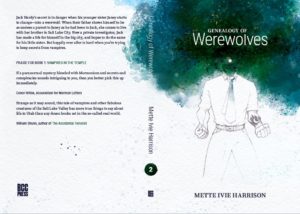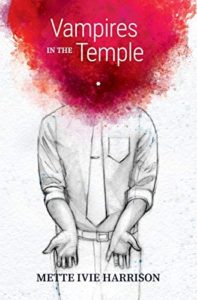 Mette Harrison introduces her new novel, Genealogy of Werewolves.
Mette Harrison introduces her new novel, Genealogy of Werewolves.
Whenever my mom reads my fantasy (in the broad sense of fantasy) stories, her response is always, “Well, it’s well written, but I don’t believe in talking animals” or fill in the blank. She doesn’t believe in magic. Or vampires. Or werewolves. Or mummies come to life. She doesn’t believe in time travel, either. Or in aliens. Or spaceships. Or robots who become sentient. It might surprise you to know that I also don’t believe in vampires or werewolves or magic or aliens, except maybe theoretically.
But I’ve been writing fantasy for decades because it allows me to write about people in situations that can’t happen in real life. I find humans endlessly interesting and I like to think about what they might do if they could go back in time and save their dying child—at the cost of their marriage. Or what they might do if the Mormon pioneers headed by Brigham Young crossed into the Salt Lake Valley and found American Indians—and also a new kind of humans called homo vampirus, who can’t speak but run quickly and drink blood to stay alive.
I’ve been accused many times of writing about characters who are thinly veiled versions of myself. This has been true since my first novel, The Monster In Me, and it is especially true of Linda Wallheim in The Bishop’s Wife. We can argue about why women authors are presumed to be able to write only about themselves at a later date. I will pretend for the sake of argument here to accept that it’s true that I’m so vain that I write only about myself. If that’s true, then of all the characters I’ve written about who are secretly me in one way or another, Jack Hardy in Vampires in the Temple and Genalogy of Werewolves is the most me yet.
I wrote the first Vampires and the Temple book in 2011, before The Bishop’s Wife. I actually sent a draft of it to the editor who eventually convinced me to write about Linda Wallheim (after I invented her) instead. Jack Hardy is a non-Mormon who has interesting things to say about Mormons as he watches them from the outside. I first wrote Jack’s story when I was trying to stay Mormon without a literal belief in Mormonism. I could see the good and the bad and I wanted to write about my experiences honestly. I was an outsider and so was Jack.
Vampires are, metaphorically in my series, a way to talk about being human. In my experience with Mormonism, there are levels of humanity in the present and even more so in the future when we’ll be sorted into various kingdoms. Vampires, who are like Neanderthals but still around, are the basest of humanity. They are us, if we take away the Mormon ideals of perfection. Vampires are a metaphor to talk about “the natural man.” They are also a way for me to tweak Mormon ideas of continual improvement, line upon line, into godhood.
And werewolves? Another metaphor, but in this case, a metaphor for being non-Mormon and rejecting from the first any hope of perfection. Werewolves are those who are corrupted by a virus and are then unable to stop themselves from becoming animals. Literally. Metaphorically. Jack Hardy is who I began to see myself as, once I had given up the hope of redemption after my daughter died. In order to stay alive I had to let go of the idea that I could become perfect or anything like a God. I wasn’t ever going to be redeemed. I wasn’t ever going to see her again in heaven. I was an animal and I was going to die here on earth and that was all there was ever going to be. It wasn’t pretty, but it was real and I needed to write a story about that.
 So, that’s who Jack is. And around him are Mormons who are deeply good people and who are also flawed and who make compromises that are morally corrupt because of the institution of the church. But Jack falls in love with them, as I fell in love with Mormonism a second time after I gave up literal belief. So if you ask me why I write about vampires and werewolves and why it sometimes feels like I’m not actually writing about vampires and werewolves, well, you are right. I have zero interest in the lore of vampires and werewolves or following other people’s rules. Sorry/not sorry. The best fantasy books (in a broad sense) are the ones that are telling you about what is going on here and now and how people really are. Sometimes those people are also yourself.
So, that’s who Jack is. And around him are Mormons who are deeply good people and who are also flawed and who make compromises that are morally corrupt because of the institution of the church. But Jack falls in love with them, as I fell in love with Mormonism a second time after I gave up literal belief. So if you ask me why I write about vampires and werewolves and why it sometimes feels like I’m not actually writing about vampires and werewolves, well, you are right. I have zero interest in the lore of vampires and werewolves or following other people’s rules. Sorry/not sorry. The best fantasy books (in a broad sense) are the ones that are telling you about what is going on here and now and how people really are. Sometimes those people are also yourself.
You can read the first two chapters of Genealogy of Werewolves here.
